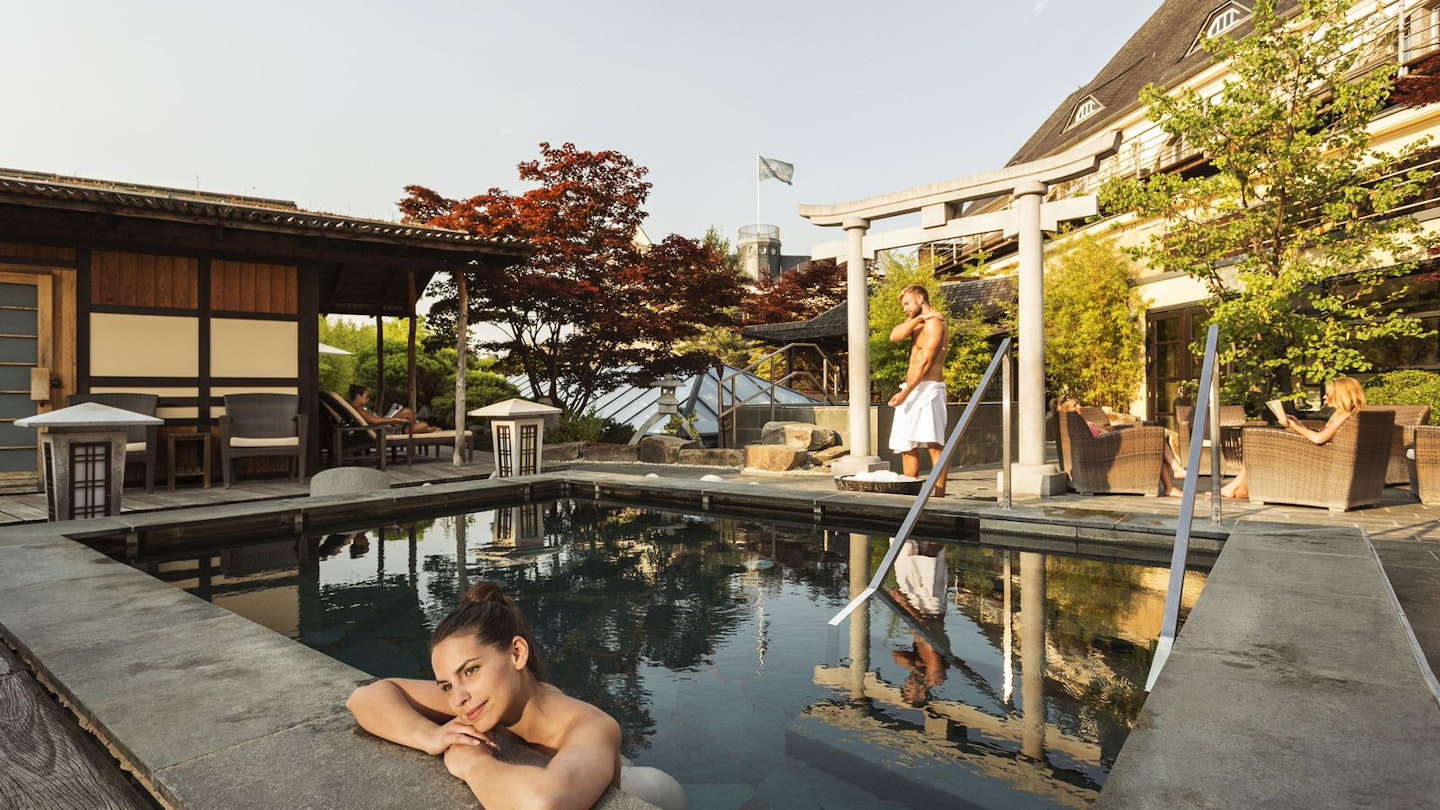Visitors to Germany have long admired its historic architecture, world-class museums, and excellent beer gardens. However, there’s one aspect of German culture that fewer travelers experience: its unique bathhouse tradition. Often housed within beautiful buildings from the art nouveau era or earlier, these public facilities are the perfect place to relax au naturel, sharing a healthy tradition with the locals.
German Bathhouse History and Culture
The key to understanding the German bathhouse experience is the nation’s famously relaxed attitude towards nudity, particularly when associated with health. This open-minded attitude towards the naked body began in the 19th century with the popularity of Scandinavian-style steam baths. Consequently, in the late 20th century, nudity became widely accepted in various outdoor settings including beaches, city parks, and walking trails. Although there has been a recent decline in outdoor nudity, the unadorned body remains the standard at bathhouses.
Each bathhouse, generally containing the German word bad (bath) in its name, features a clothed area centered around a swimming pool, much like any municipal fitness center. Separately, for an additional fee, visitors can access a spa facility complete with saunas and heated pools. This area, a clothing-free, mixed-gender zone, does not separate men and women as it commonly occurs in public baths in countries like Korea or Japan.
If you’re from a more conservative nation, this comprehensive nudity may take some getting used to. However, you will soon find that there’s nothing sexual about the bath setting; quickly, you’ll feel comfortable sitting naked on your towel in the sauna like everyone else.
Munich
The Bavarian capital Munich is the epicentre of the German nonchalance towards nudity, with its Englischer Garten being famous for clothing-free sunbathing during the warmer months.
Near the garden is Müller’sche Volksbad, an even more magnificent place to let it all hang out. Constructed in 1901 with elegant art nouveau design, this bathhouse was donated to the city by engineer Karl Müller on the condition that it welcomed the less fortunate. Located on the banks of the Isar River, it’s a beautifully maintained architectural gem.
Its lofty entrance hall features marble pillars and ornate light fixtures, with doors adorned by curving scripts promising indulgences such as the Schwimmhallen (swimming halls) and Römisch-Irisches Schwitzbad (Roman-Irish sweat bath).
The old-school charm continues in the spa zone, where guests disrobe inside attractive cabins with timber panels and glass panes. From there, you can transition between various rooms, including saunas, cold and tepid pools, and a room featuring stone benches with a dramatic steam jet. Additionally, there’s an upstairs rest area with deckchairs for unwinding between sessions.
Once you’ve finished bathing, consider floating through a cloud of relaxation to explore the exhibits at the nearby Deutsches Museum, the world’s largest museum of science and technology.
Hamburg
The most impressive bathhouse in the port city of Hamburg is Kaifu-Bad, which opened in 1895 and features a graceful neoclassical facade.
One of its standout features is the large flotation pool, surrounded by pillars and illuminated by natural light from Gothic windows and skylights. Here, visitors can enjoy serene music playing underwater, enhancing the experience of weightless relaxation.
Next, delve into the spa area, where a variety of wellness facilities await: a eucalyptus room, a sauna adorned with colored lights, and a large Finnish-style sauna. Occasionally, while you’re quietly enjoying the sauna, an attendant may enter, pouring water over the hot stones and waving a flag-like cloth to evenly distribute the rising heat throughout the space. This is certainly not a ritual for the faint-hearted!
Cologne
One of Germany’s most beautiful bathhouses is located in Cologne, a city that was once governed by the Romans, known for their affinity for hot baths. Established in 1912, Neptunbad is a charming art nouveau building adorned with tiles and mosaics.
The facility features a fitness center on one side, where visitors can exercise beneath high-arched windows. On the opposite side lies the spa zone, reminiscent of imperial-era elegance. Its Roman-inspired steam rooms and plunge pools are dimly lit and soothing, with the highlight being the circular Kaiserbad (Emperor’s bath), where one can float while classical music plays beneath the water’s surface.
Outside, visitors may be surprised to find a spa complex featuring an Asian style, complete with several indoor and outdoor saunas and pools, sun terraces, and a zen garden. Each sauna offers different temperatures and aromas, ensuring a variety of choices for relaxation.
Moreover, the outdoor area is surprisingly overlooked by nearby residences. But that’s Germany for you—completely unfazed by a bit of nudity when in the right setting.
Baths Beyond
The traditional German bathhouse experience is available throughout the country, often housed within historic premises that enhance the enjoyment.
In Berlin, visit Stadtbad Neukölln, a stunning 1914 facility adorned with beautiful mosaics, frescoes, brass fittings, and marble. The pride of Wiesbaden is the magnificent Kaiser-Friedrich-Therme, built in 1913 on the site of a Roman-era steam bath, featuring saunas and pools filled with naturally heated water. In Darmstadt, the 1909 swimming and spa complex Jugendstilbad boasts multiple dry and wet saunas, along with indoor and outdoor pools enjoyed year-round.
And of course, there’s the renowned Baden-Baden in Germany’s southwest, a town whose name highlights its deep connection with bathhouse culture. Experience the opulence at the Friedrichsbad, a palatial facility from 1877 showcasing exquisite marble and mosaic details that exemplify the German genius for intertwining the simple act of bathing with architectural beauty.




